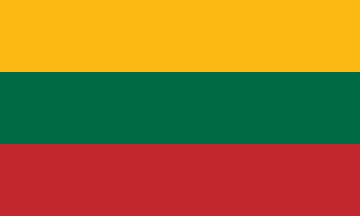Lithuania Demands Russian Compensations for 1991
 On 16 January the Lithuanian Parliament, the Seimas, voted on a resolution demanding compensations from Moscow for the Soviet-Russian attack of 1991. On 13 January that year troops stormed the television tower in the capital Vilnius, while thousands of unarmed Lithuanians tried to defend the building, hand-in-hand. Thirteen people lost their lives, and hundreds were wounded.
On 16 January the Lithuanian Parliament, the Seimas, voted on a resolution demanding compensations from Moscow for the Soviet-Russian attack of 1991. On 13 January that year troops stormed the television tower in the capital Vilnius, while thousands of unarmed Lithuanians tried to defend the building, hand-in-hand. Thirteen people lost their lives, and hundreds were wounded.For the sake of clarity, it wasn't the today so much criticized president Vladimir Putin who was in charge in the Kremlin, nor was it Boris Yeltsin who ordered the raid in his usual but not so sober condition. The Soviet Union still existed at that time, even though it was becoming clear that union was coming to its end. And the head of state at that time was still, indeed, Mikhail Gorbachev. In fact, only a month earlier he had been in Oslo to collect the Nobel Peace Prize, and in the West he never had to account much for the attack on Lithuania and the deaths it caused. The intervention in Lithuania came a few days after an ultimatum he had given to Lithuania to respect the constitution of the Soviet Union and withdraw its declaration of independence of 11 March 1990. A month later though, on 9 February 1991, 90.47% of Lithuanians voted in favor of independence in a referendum, and yet another month later Lithuania's de facto independence was already recognized by a range of countries. Estonia and Latvia followed soon the Lithuanian example, and today the three Baltic states are members of both NATO and the European Union.
But sixteen years after the facts, no compensations have been paid yet for the victims of the attack, and the events continue to cause conflicts between Lithuania and Russia. The Russian Federation is internationally recognized as the legal successor of the Soviet Union, and therefore Lithuania sent the damage claim to Moscow. Already in 2000 a special governmental commission had estimated the damage of the fifty year occupation to roughly 28 billion dollars. The bill the Lithuanian Parliament sent to Moscow this year mentions 24 billion euro. In 1992, Lithuanians decided in a referendum that the government should try to collect compensations for the events of January 1991, but until now not much has happened.
As could be expected, the Russians aren't amused by the new Lithuanian initiative. Liberal democrat (Russian style) Vladimir K. Gusev (LDPR), first deputy chairman of the committee on economic policy, business and property of the Russian Federation Council
 , told in a reaction that «before adopting such resolutions politicians should have counted how much all the former Soviet republics have invested in Lithuania's development». According to him, Lithuania owes Russia a sum exceeding Lithuania's claims dozens of times, recalling that the Soviet Union built two thirds of Lithuania's industrial facilities, including petrochemical plants, the Klaipėda seaport and several arms manufacturing plants.
, told in a reaction that «before adopting such resolutions politicians should have counted how much all the former Soviet republics have invested in Lithuania's development». According to him, Lithuania owes Russia a sum exceeding Lithuania's claims dozens of times, recalling that the Soviet Union built two thirds of Lithuania's industrial facilities, including petrochemical plants, the Klaipėda seaport and several arms manufacturing plants.Valery T. Kadokhov, first deputy chairman of the committee on federation affairs and regional policies shares Gusev's view. «If we extend Seimas's line of thought, the damage can be calculated since the times of the Lithuanian Principality's hit-and-run raids against Russia,» he said. The Russian Ministry of Foreign Affairs wasn't impressed either by the Lithuanian resolution, and said it ignored all legal, historical and political realities.
Labels: Gorbachev | Mikhail, Gusev | Vladimir, Kadokhov | Valery, Lithuania, Putin | Vladimir, Russia, Yeltsin | Boris
 Tag at del.icio.us
Tag at del.icio.us
